#faux Palestinians
Explore tagged Tumblr posts
Text
The faux Palestinians are always appropriating someone else's history, because theirs began in 1967, with an assist from the KGB.
Here, they plagiarize the cover of a book on Armenians, and claim it's a Palestinian family in Israel.
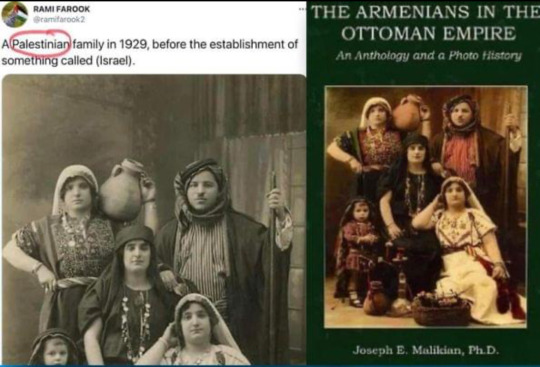
#pallywood#Hamas#Palestinians#faux Palestinians#israel#secular-jew#jewish#judaism#israeli#jerusalem#diaspora#secular jew#secularjew#islam#never again#Armenians#fake narrative#fake history#liars#muslim brotherhood#Islamist#Islamists
316 notes
·
View notes
Text

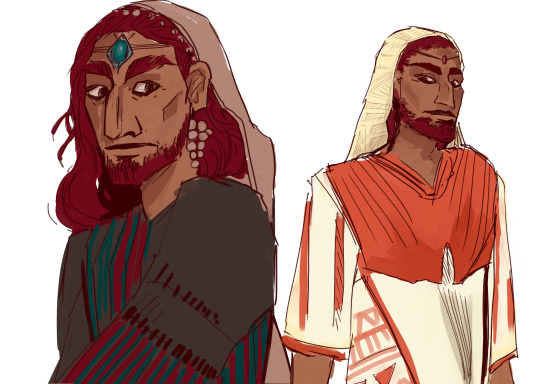
two things that bother me about all zelda gerudo designs so much is that the female designs are just completely oversexualized for no reason (would be so fucking impractical in a desert) and that ganondorf's outfit is based on eastern asian fashion and not... middle eastern fashion?
#myposts#totk#zelda#myart#the legend of zelda#i love the gerudo so much but someone really needs to take them away from nintendo :(#like these cheap halloween faux belly dancer outfits... dude.#i mostly used palestinian traditional outfits for these designs because their fashion is really cool :) one of them is from a yemeni one th#and i also gave ganondorf more traditionally female outfits because....... like i said.#why would a culture that isnt aware of gender 99% of the time have a different type of fashion per gender.#like that would be so dumb of them :/
108 notes
·
View notes
Text

pissing me the fuck off honestly
#and you blame others for all the leftist in-fighting. when faced with a landslide right-wing victory you immediately pull shit like this#mind you these “faux activists” were often themselves palestinian-american! whatever helps you sleep at night#I understand how dark this feels I understand the consequences of this but I don't know how else to say that the general#population is shifting right. but go ahead and ignore the material conditions affecting the political and blame random people on your phone#log
6 notes
·
View notes
Text
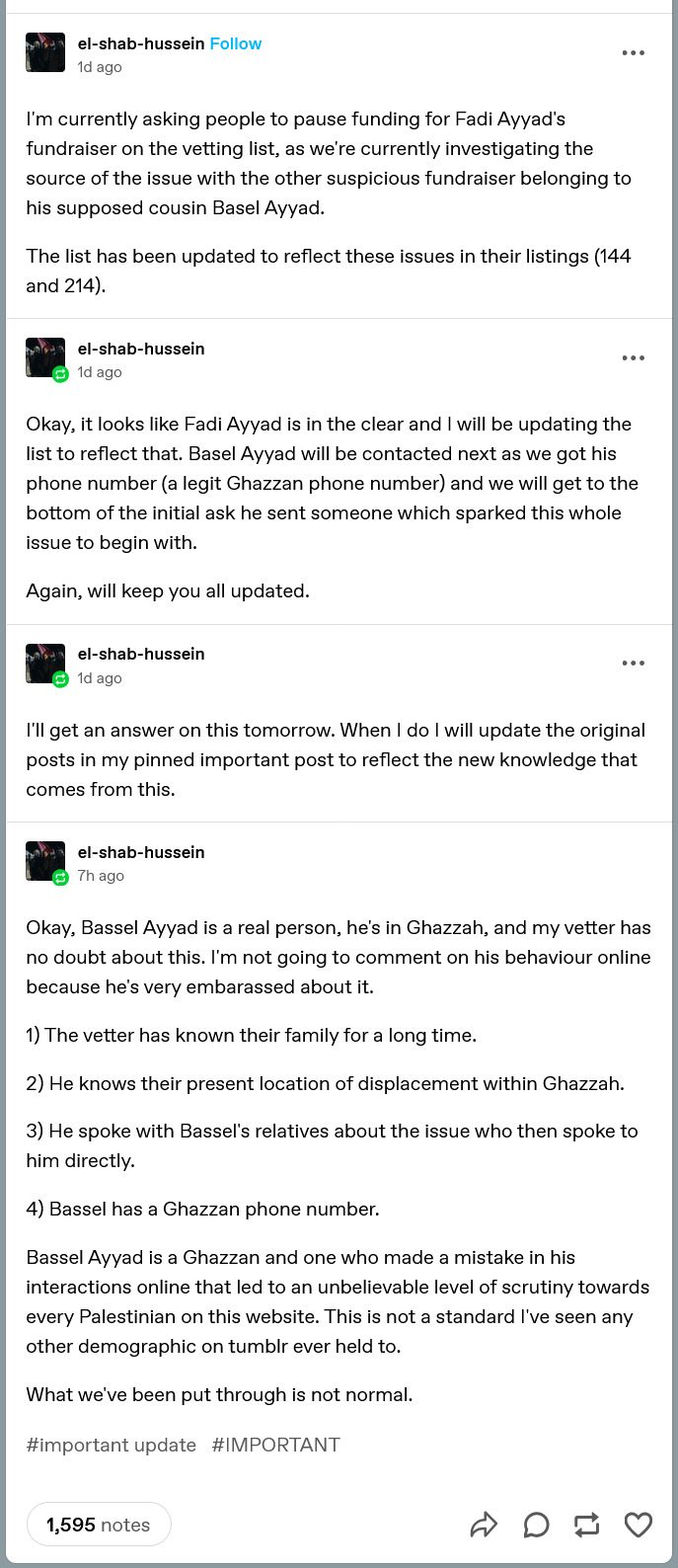
Link
This is a well-known Palestinian user and vetter explaining that they are completely confident that the pornbotlike ask sent by an account with a verified fundraiser was a result of "embarrassing behavior/a mistake in online interactions."
This would be more plausible if it was a one time occurrence, but this blog sent the exact same ask to (at minimum) three separate accounts:
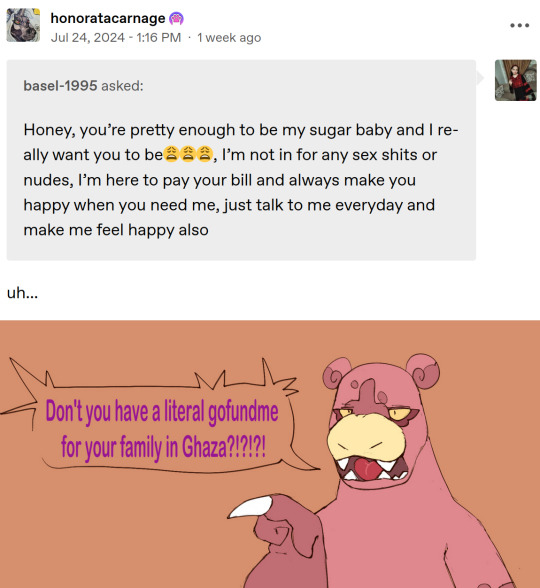
Link

Link

Link
These asks are all identical, to the letter - that's how I found them. This is, needless to say, very strange for any person to do on tumblr, least of all someone who is raising money to try and protect their family from a genocide. glitzyboo, for example, does not post images of themselves or reblog anything remotely close to NSFW, so it's very very odd behavior for someone to tell them they are "pretty enough" for anything. It is even more suspicious when you consider the very long history of porn bots sending sugar daddy scam asks on this site.
I don't know what is going wrong here - who is mistaken about what, what part of the process is breaking down, but the story told in the above post, that this was an embarrassing social faux pas that happened one time and was sent by a real person who was horny, does not hold up to scrutiny.
4K notes
·
View notes
Text
A truly amazing "masks off" moment

Anyone else want "jew licking freak" on a T-shirt now?
This is from a tiny Twitter account that could be a bot. Or it could be an asshole who also claims to want peace for everyone and also is just REALLY into Pokemon.
(I looked through their account. For years it was mostly stuff about Pokemon games, and promoting their own also-tiny, now-private YouTube account, along with a smattering of political stuff. Now it's a little Pokemon, lots of angry commenting about I/P politics.)
The best thing about this is that Hen Mazzig is both Israeli and Jewish. But this person, like the entire rest of the Faux-Palestinian movement, assumes that all Israelis and Jews are "white" people with Ashkenazi names.
And Hen Mazzig is North African and Iraqi: part of the Mizrahi majority of Israel Jews.
So he didn't ping their Zionist Radar.
Instead, they assumed he was just... some "freak" who "licks Jews??"
big "race traitor" vibes from them tbh
From their older posts, I think they may be Saudi Arabian. So it's possible the vibes are intentional. Idk.
#antisemitism#jumblr#it's possible they meant to say Jew bootlicker but like... not different enough.#tshirt ideas#wall of words
327 notes
·
View notes
Note
Hey, quick question, who's killing Palestinians? Is it Israelis, or is it Americans? I'd have replied, but you have replies restricted.
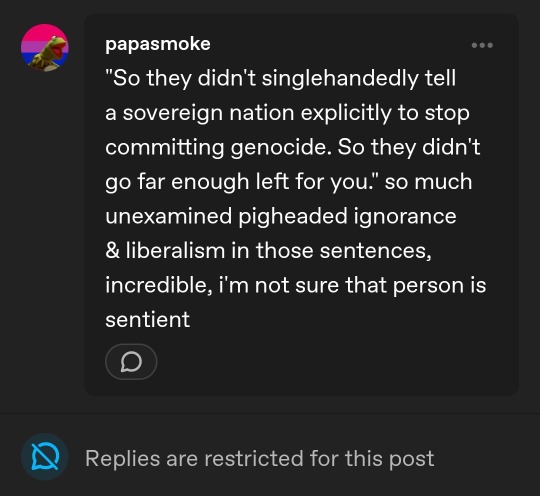
September 2, 2024
You know as well as I do that Israel wouldn't have been able to commit this holocaust or invade Lebanon or bomb Iran without the enthusiastic steadfast unwavering zero-red-line ironclad support of the Biden administration. I'm not going to entertain your faux incredulity. It is transparent horseshit.
279 notes
·
View notes
Text
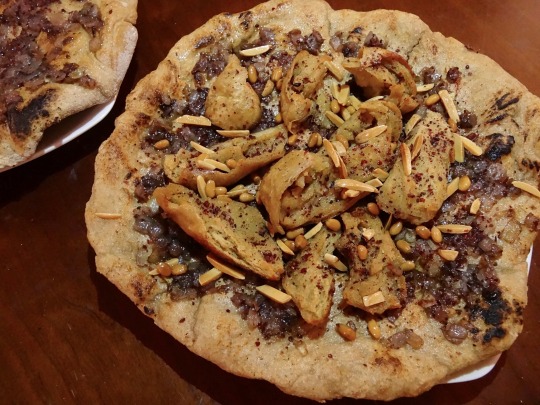

[ID: Two large flatbreads. The one in the center is topped with bright purple onions, faux chicken, fried nuts, and coarse red sumac; the one at the side is topped with onions and sumac. Second image is a close-up. End ID]
مسخن / Musakhkhan (Palestinian flatbread with onions and sumac)
Musakhkhan (مُسَخَّن; also "musakhan" or "moussakhan") is a dish historically made by Palestinian farmers during the olive harvest season of October and November: naturally leavened flatbread is cooked in clay ovens, dipped in plenty of freshly pressed olive oil, and then covered with oily, richly caramelized onions fragrant with sumac. Modern versions of the dish add spiced, boiled and baked chicken along with toasted or fried pine nuts and almonds. It is eaten with the hands, and sometimes served alongside a soup made from the stock produced by boiling the chicken. The name of the dish literally means "heated," from سَخَّنَ "sakhkhana" "to heat" + the participle prefix مُـ "mu".
I have provided instructions for including 'chicken,' but I don't think the dish suffers from its lack: the rich, slightly sour fermented wheat bread, the deep sweetness of the caramelised onions, and the true, clean, bright expressions of olive oil and sumac make this dish a must-try even in its original, plainer form.
Musakhkhan is often considered to be the national dish of Palestine. Like foods such as za'tar, hummus, tahina, and frika, it is significant for its historical and emotional associations, and for the way it links people, place, identity, and memory; it is also understood to be symbolic of a deeply rooted connection to the land, and thus of liberation struggle. The dish is liberally covered with the fruit of Palestinian lands in the form of onions, olive oil, and sumac (the dried and ground berries of a wild-growing bush).
The symbolic resonance of olive oil may be imputed to its history in the area. In historical Palestine (before the British Mandate period), agriculture and income from agricultural exports made up the bulk of the economy. Under مُشَاعْ (mushā', "common"; also transliterated "musha'a") systems of land tenure, communally owned plots of land were divided into parcels which were rotated between members of large kinship groups (rather than one parcel belonging to a private owner and their descendants into perpetuity). Olive trees were grown over much of the land, including on terraced hills, and their oil was used for culinary purposes and to make soap; excess was exported. In the early 1920s, Palestinian farmers produced 5,000 tons of olive oil a year, making an average of 342,000 PL (Palestinian pounds, equivalent to pounds sterling) from exports to Egypt alone.
During the British Mandate period (from 1917 to 1948, when Britain was given the administration of Palestine by the League of Nations after World War 1), acres of densely populated and cultivated land were expropriated from Palestinians through legal strongarming of and direct violence against, including killing of, فَلّاَحين (fallahin, peasants; singular "فَلَّاح" "fallah") by British troops. This continued a campaign of dispossession that had begun in the late 19th century.
By 1941, an estimated 119,000 peasants had been dispossessed of land (30% of all Palestinian families involved in agriculture); many of them had moved to other areas, while those who stayed were largely destitute. The agriculturally rich Nablus area (north of Jerusalem), for example, was largely empty by 1934: Haaretz reported that it was "no longer the town of gold [i.e., oranges], neither is it the town of trade [i.e., olive oil]. Nablus rather has become the town of empty houses, of darkness and of misery". Farmers led rebellions against this expropriation in 1929, 1933, and 1936-9, which were brutually repressed by the British military.
Despite the number of farmers who had been displaced from their land by European Jewish private owners and cooperatives (which owned 24.5% of all cultivated land in Palestine by 1941), the amount of olives produced by Palestinians increased from 34,000 tons in 1931 to 78,300 in 1945, evidencing an investment in and expansion of agriculture by indigenous inhabitants. Thus it does not seem likely that vast swathes of land were "waste land," or that the musha' system did not allow for "development"!
Imprecations against the musha' system were nevertheless used as justification to force Palestinians from their land. After various Zionist organizations and militant groups succeeded in pushing Britain out of Palestine in 1948—clearing the way for hundreds of thousands of Palestinians to be dispossessed or killed during the Nakba—the Israeli parliament began constructing a framework to render their expropriation of land legal; the Cultivation of Waste Lands Law of 1949, for example, allowed the requisition of uncultivated land, while the Absentees’ Property Law of 1950 allowed the state to requisition the land of people it had forced from their homes.
Israel profited from its dispossession of millions of dunums of land; 40,000 dunums of vineyards, 100,000 dunums of citrus groves, and 95% of the olive groves in the new state were stolen from Palestinians during this period, and the agricultural subsidies bolstered by these properties were used to lure new settlers in with promises of large incomes.
It also profited from the resulting "de-development" of the Palestinian economy, of which the decline in trade of olive oil furnishes a striking example. Palestinian olive farmers were unable to compete with the cheaper oils (olive and other types) with which Zionist, capital-driven industry flooded the market; by 1936, the 342,000 PL in olive oil exports of the early 1920s had fallen to 52,091 PL, and thereafter to nothing. While selling to a Palestinian captive market, Israel was also exporting the fruits of confiscated Palestinian land to Europe and elsewhere; in 1949, olives produced on stolen land were Israel's third-largest export. As of 2014, 12.9% of the olives exported to Europe were grown in the occupied West Bank alone.
This process of de-development and profiteering accelerated after Israel's military seizure of the West Bank and Gaza in 1967. In 1970, agriculture made up 34% of the GDP of the West Bank, and 31% of that of Gaza; in 2000, it was 16% and 18%, respectively. Many of those out of work due to expropriated or newly unworkable land were hired as day laborers on Israeli farms.
Meanwhile, Palestinians (and Israeli Palestinians) continued to plant and cultivate olives. The fact that Palestinians do not control their own water supplies or borders and may expect at any time to be barred by the military from harvesting their fields has discouraged investment and led to risk aversion (especially since the outmoding of the musha' system, which had minimized individual risk). In this environment, olive trees are attractive because they are low-input. They can subsist on rainwater (Israel monopolizes and poisons much of the region's water, and heavily taxes imports of materials that could be used to build irrigation systems), and don't require high-quality soil or daily weeding. Olive trees, unlike factories and agricultural technology, don't need large inputs of capital that stand to be wasted if the Israeli military destroys them.
Olive trees are therefore the chosen crop when proving a continued use of land in order to prevent the Israeli military from expropriating it under various "waste" or "absentee" land laws. Palestinians immediately plant olive seedlings on land they have been temporarily forced from, since even land that has lain fallow due to status as a military closed zone can be appropriated with this justification. The danger is so pressing that Palestinian agronomists encouraged this habit (as of 1993), despite the fact that Israeli competition and continual planting had lowered olive crop prices, and despite the decline in soil quality that results from never allowing land to lie fallow. In more recent years, olive trees have yielded primary or supplementary income for about 100,000 Palestinian families, producing up to 191 million USD in value in good years (including an average of 17,000 tons of olive oil yearly between 2001 and 2009).
Israeli soldiers and settlers have famously uprooted, vandalized, razed, and burned millions of these olive trees, as well as using military outposts to deny Palestinian farmers access to their olive crops. It prefers to restrict Palestinians to annual crops, such as vegetables and grains, and eliminate competition in permanent crops, such as fruit trees.
This targeting of olive trees increases during times of intensified conflict. During the currently ongoing olive harvest season (November 2023), Gazan olive farmers have reported being targeted by Israeli war planes; some farmers in the West Bank have given up on harvesting their trees altogether, due to threats issued by organized networks of settlers that they would kill anyone seen making the attempt.
The rootedness of olive trees in the history of Palestine gives them weight as a symbol of homeland, culture, and the fight for liberation. Palestinian olive harvest festivals, typically celebrated in October with singing, dancing, and eating, have inspired similar events elsewhere in the world, aimed at sharing Palestinian food and culture and expressing solidarity with those living under occupation.
Support Palestinian resistance by calling Elbit System’s (Israel’s primary weapons manufacturer) landlord, donating to Palestine Action’s bail fund, and donating to the Bay Area Anti-Repression Committee bail fund.
Ingredients:
For the dish:
2 pieces taboon bread, preferably freshly baked
2 large or 3 medium yellow onions (480g)
1 cup first cold press extra virgin olive oil (زيت زيتون البكر الممتاز)
1 Tbsp coarsely ground Levantine sumac (سماق شامي / sumaq shami), plus more to top
Ground black pepper
For the chicken (optional):
500g chicken substitute
5 green cardamom pods, or 1/4 tsp ground cardamom
4 cloves, or pinch ground cloves
1 Mediterranean bay leaf
1 Tbsp ground sumac
For the nut topping (optional):
2 Tbsp slivered almonds
2 Tbsp pine nuts
Neutral oil, for frying
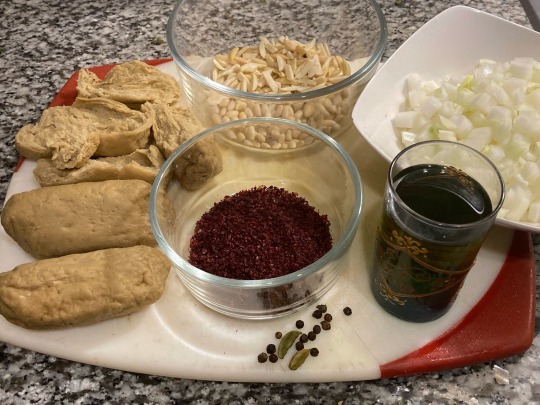
Notes on ingredients:
Use the best olive oil that you can. You will want oil that has some opacity to it or some deposits in it. I used Aleppo brand olive oil (7 USD a liter at my local halal grocery).
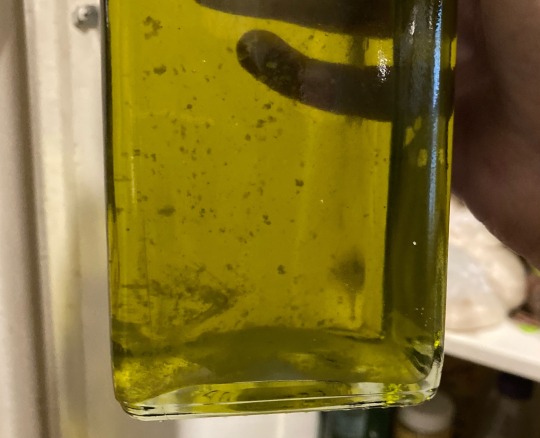
If you want to replace the taboon bread with something less laborious, I would recommend something that mimics the rich, fermented flavor of the traditional, whole-wheat, naturally leavened bread. Many people today make taboon bread with white flour and commercial yeast—which you might mimic by using storebought naan or lavash, for example—but I think the slight sourness of the flatbread is a beautiful counterpoint to the brightness of the sumac and the sweetness of the caramelized onions. I would go with a sourdough pizza crust or something similar.
Your sumac should be coarsely ground, not finely powdered; and a deep, rich red, not pinkish in color (like the pile on the right, not the one on the left).

For this dish, a whole chicken is usually first boiled (perhaps with spices including bay leaves, cardamom, and cloves) and then baked, sometimes along with some of the oil from frying the onions. I call for just frying or baking instead; in my opinion, boiling often has a negative effect on the texture of meat substitutes.
Instructions:
For the onions:
1. Heat a cup of olive oil in a large skillet or pot. Fry onions on medium-low, stirring often, for 10 minutes or until translucent.

2. Add 1 Tbsp sumac and a few cracks of black pepper and reduce to low. Cook for another 30 minutes, stirring occasionally, until onions are sweet, reduced in volume, and pinkish in color.
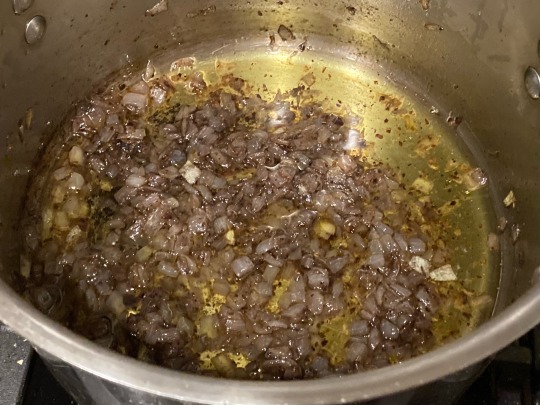
For the chicken:
1. Briefly toast and finely grind spices except for sumac (cardamom, cloves, and bay leaf). Filter with a fine mesh sieve. Dip 'chicken' into the pot in which you fried the onions to coat it with olive oil, then rub spices (including sumac) onto the surface.
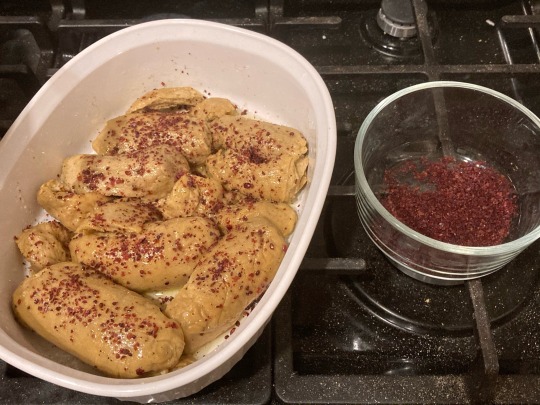
2. Sear chicken in a dry skillet until browned on all sides; or bake, uncovered, in the top third of an oven heated to 400 °F (200 °C) until browned.
For the nut topping:
1. Heat a neutral oil on medium in a small pot or skillet. Add almonds and fry for 2 minutes, until just starting to take on color. Add pine nuts and fry until both almonds and pine nuts are golden brown. Remove with a slotted spoon.
To assemble:
1. Dip each flatbread in the olive oil used to fry the onions, then spread onions over the surface.
Some cooks dip the bread entirely into oil; others press it lightly into the surface of the oil in the pot on both sides, or one side; a more modern method calls for mixing the olive oil with chicken broth to lighten it. Consult your taste. I think the bread from my taboon recipe stands up well to being pressed into the oil on both sides without tearing or becoming soggy.
2. Top flatbread with chicken and several large pinches more sumac. Bake briefly in the oven (still heated to 400 °F / 200 °C), or broil on low, for 3-5 minutes, until the sumac and the surface of the bread have darkened a shade.
3. Top with fried nuts.
Musakhkhan is usually eaten by ripping the chicken into bite-sized pieces, tearing off a bit of bread, and eating the chicken using the bread.
Some cooks make a layered musakhkhan, adding two to three pieces of bread covered with onions on top of each other before topping the entire construction with chicken and pine nuts.
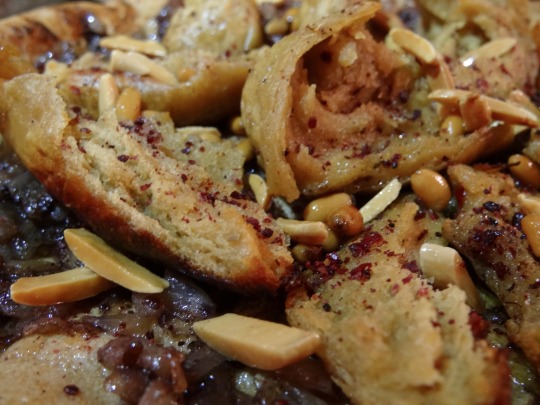
820 notes
·
View notes
Text
Mahmoud Khalil, a Palestinian graduate student at Columbia University, was forcibly abducted on March 8, by undercover Immigration and Customs Enforcement (ICE) agents who stalked him on his way home to university housing. Khalil was targeted for his activism and involvement in Columbia’s student encampments protesting the ongoing genocide in Gaza. His detention is not just an injustice—it is a blatant act of vengeance for going against U.S. and Israeli coordinated crimes.
The Trump Administration called for his deportation by name and set forth a dangerous and targeted campaign against the nation’s university system with the ultimatum that student pro-Palestinian activism is grounds for deportation.
By all accounts, Khalil’s abduction and detainment make him a political prisoner. However, we must not fall into the trap of what Mohammed El Kurd, in his new book Perfect Victims, calls, “singularity.”
“Singular stories, especially when told recklessly, tend to isolate the individual from the group, sanctifying the former and demonizing the latter. Singular stories tend to situate man-made atrocities outside of politics reinventing them as inexplicable natural disasters.”
By treating each case as an exception, the machinery of suppression continues unchallenged. Khalil’s ordeal is not about a single student; it is about a state’s ongoing efforts to silence those who dare to resist.
In fact, Mahmoud Khalil’s abduction is not an anomaly, but part of a long-standing pattern of state persecution against Palestinians who dare challenge state hegemony. By isolating his case from the broader history of criminalizing Palestinian activism, the narrative becomes watered down and stripped of its political relevance and the historical state-sanctioned violence that ensued. It misrepresents Khalil’s situation instead, making it an individual misfortune or a freak incident.
Mahmoud Khalil’s abduction is not an anomaly, but part of a long-standing pattern of state persecution against Palestinians who dare challenge state hegemony.
Khalil’s detention follows decades of targeted harassment, imprisonment, and deportation of Palestinian students, scholars, and community leaders in the U.S. From the Holy Land Foundation Five to Dr. Sami Al-Arian, the playbook remains the same: fabricate charges, apply excessive force, and erase the political motivations behind the repression. When viewed in this context Khalil’s case is not the exception, but rather the rule.
Take the case of Dr. Sami Al Arian, a Palestinian U.S. permanent resident and professor at the University of Florida who was arrested in February 2003 on faux charges of conspiring to aid Palestinian terrorism. Dr. Al Arian was imprisoned and subjugated to continuous months of solitary confinement and abuse which lasted 3 years when a Florida jury failed to return a single guilty verdict of any of the 17 charges against him. However, prosecutors refiled the charges, and Dr. Al Arian chose instead to plead guilty and take jail time rather than face a re-trial.
In an interview with Democracy Now, Dr. Al Arian stated that his unjust imprisonment was a “retaliatory action against any activist” and was a time of extreme “intolerance, exclusionary political and hegemony [taking] center stage, where rational people were no longer able to advance any kind of dialogue.”
Then there is the case of the Holy Land Foundation Five (HLF), where Palestinian American philanthropists who once ran the largest Muslim charity in the U.S. were shut down by the Bush administration as designated as a terrorist group. According to Human Rights Watch, the defendants in the HLF case were never accused of directly funding terrorist groups or attacks, yet they were still prosecuted under U.S. “material support” legislation. Their leaders are serving upwards of 65 years in federal prison.
And for some of them, their conditions in prison are only worsening. Shukri Abu Baker is serving a 65-year sentence and currently facing new types of abuse by correctional officers. During the holy month of Ramadan, Shukri Abu Baker is not allowed to sleep after 5 a.m. His daughter Nida Abu Baker tells me that “for a full week straight, they’d take my dad to the cafeteria from 4 a.m. and he would stand there for hours. He was required to stop all the Muslim inmates from taking extra food back to their cells. He had to do the job of a correctional officer and he had to do this 3 times a day, breakfast, lunch, and dinner all while fasting as a 66-year-old man with aching bones.”
Nida says when she looks at what is currently taking place across the country, she can’t help but feel deja vu. “The FBI went knocking on the doors of hundreds of Palestinian families after the HLF indictments. Some of whom were deported after being detained by ICE, and I specifically remember a family had their green cards revoked.”
“So everything that’s happening is not new, and I am not surprised it all started decades ago on U.S soil when the government went after students and professionals who were giving back to their community.”
In 2022, I wrote about how Shukri nearly died after inhaling fumes from tear gas thrown at inmates, and at the time he told me he did not want to advocate for his condition in prison to change: “I don’t wish this incident to become the focal point of my struggles. I am not trying to improve the conditions of my incarceration, rather I am challenging the very premise of my presence here.”
“The prosecutors wanted to make sure my family and I pay heavily for not toeing the line of bigotry against the Palestinians who were in dire need for humanitarian aid.”
Given this history, it is essential that we heed Mohammed El-Kurd’s words and not sanctify one case while completely ignoring another, as it’s clear the target is Palestine and the Palestinian movement for liberation in total. The dangerous results of this can already be seen in several other cases that have not received nearly the same level of attention as Khalil’s.
Swiftly after Khalil’s abduction, ICE detained a foreign student, Ranjani Srinivasan for participating in “activities supporting Hamas.” Srinivasan chose to flee the country to Canada on March 11 before she could be deported.
“It is a privilege to be granted a visa to live and study in the United States of America. When you advocate for violence and terrorism, that privilege should be revoked, and you should not be in this country. I am glad to see one of the Columbia University terrorist sympathizers use the CBP Home app to self-deport,” Department of Homeland Security Secretary Kristi Noem said.
Srinivasan’s visa revocation and flight from the country did not make international news nor garner calls advocating for a student’s right to freedom of expression in the same way Khalil’s case did. The obvious reason could be the injustice that Khalil has permanent residency and is married to a U.S. citizen, while Srinivasan was in a more vulnerable position on a student visa and made the tough decision to leave her place of study behind and save herself from U.S. persecution.
It is understandable to find the absurdity of Khalil’s case, especially when we try to highlight his supposedly secure legal status when trying to advocate on his behalf. However, we in the pro-Palestinian solidarity movement are setting ourselves up for failure if we accept these arbitrary distinctions. By being keen on highlighting Khalil’s legal status, we are inadvertently justifying the deportations of thousands of people on student visas who dare fight against the United States’ genocidal crimes.
We are already seeing the danger of our actions. This weekend, Brown University professor and doctor Rasha Alawieh, who specializes in kidney transplants, was deported to Lebanon upon her arrival at Boston airport. The Department of Justice justified the deportation after “finding sympathetic photos and videos of prominent Hezbollah figures in the deleted items folder” of Alawieh’s cell phone.
Even if Khalil supported Hamas, and Alawieh supported Hezbollah, they have not committed a crime that would justify their abductions and deportations.
Instead of highlighting this fundamental right, Khalil’s lawyer Amy Greer spoke to NBC News about Khalil’s case asserting that supporting Hamas “is not what he stands for. That would be completely opposite to his values.” Greer had an opportunity to push back, and to protect the rights of all students, and all people that have an even more vulnerable status than Khalil. The fundamental basis of a deportation cannot and should not ever be justified due to one’s political beliefs. Greer should have reaffirmed that even if he did support Hamas, he has not committed a crime, Alawieh has not committed a crime and neither has any other student or professional demanding the liberation of the Palestinian people.
By attempting to distance Khalil from any accusations of political alignment rather than challenging the legitimacy of such accusations altogether, Greer reinforced the very framework that allows for the criminalization of Palestinian activism. The issue is not whether Khalil or any other individual meets an arbitrary threshold of acceptability in the eyes of the state, but rather that no one should face deportation, imprisonment, or retaliation for their political beliefs.
This failure to challenge the state’s power to police political thought does not just abandon Khalil, it abandons every student, professor, journalist, and activist who has been, or will be targeted for their advocacy. It leaves the door open for the next arrest, the next deportation, the next political prisoner.
To protect only those deemed “acceptable” within the limits of state-sanctioned discourse is to concede the broader fight for fundamental rights. The defense of political speech must be absolute, without exceptions or qualifiers.
And finally, and most importantly, in our efforts to fight for Khalil we must always re-center Palestine, the assault on the West Bank, the genocide and starvation campaign in Gaza. Khalil’s abduction was meant to intimidate and ultimately stifle the movement from acting on its greater goal to end our complicity in the crimes against the Palestinian people. His abduction was meant to destroy our morale and scare us into silence. It was also meant to give institutions more power to censor and repress pro-Palestinian students, faculty, and professionals from being loud. We can’t let them win- it is our imperative, now more than ever, that we do not concede to the fascistic attempts to silence us.
77 notes
·
View notes
Text
This notion that the Zionist Enemy has somehow benefited from Oct. 7 is the height of faux-intellectual stupidity. Everything the Zionist enemy is doing now it would have done anyway with no "provocation", hence why Palestinian support for the resistance is unflagging. Oct. 7 was a deathblow to the entire Zionist project; to its credibility, to its economy, and to its diplomatic standing both in the region and in the world. This will become readily apparent in the coming months. (Though it's already obvious now, given that all of the supporters of the Zionist Enemy are decrepit, dying powers.)
572 notes
·
View notes
Text
on one hand it's tempting to point out to the drooling cretins who bring up lgbt rights as a ~gotcha~ against palestinian liberation that the palestinian territories don't have homogeneous laws on lgbt rights, and while homosexuality is outlawed in gaza, it's legal in the west bank and has been since 1951 (before israel legalized it in 1988 btw) but on the other hand even bringing this up is beside the point. even if palestine were every bit as unanimously homophobic as faux-progressive zionists like to pretend, israel's actions would still be utterly indefensible.
504 notes
·
View notes
Text

That’s what makes anti-Semites so interesting, from an anthropological standpoint. They hardly ever have anything new or original to say, but when they stumble over a variant that’s new to them, they act like they just made the greatest discovery of all mankind. Like they’re the radical messiah, whatever radicalism means to them. Like university students think they’re so hardcore putting up fliers accusing Jews of cannibalizing Palestinian children and harvesting their organs, but really, that’s just old shit that’s been rattling around Western anti-Jewish speech/rhetoric since the LITERAL 12th century.
The more I study the history of anti-Semitism(s), the more desire I have to write a sardonic faux-anthropological study of anti-Semites. Like, create a taxonomy and shit.
Now if you’ll excuse me, I’m gonna go make mean faces at a communion wafer.
382 notes
·
View notes
Text
The story:
The BBC has apologised for reporting Hamas claims that the Israeli army was responsible for carrying out “summary executions” in the Gaza strip without seeking sufficient corroborating evidence. The story, which appears to have been based on a report from the news agency AFP [Agence France-Presse], centered on a statement from the Hamas terror group. It accused Israeli troops of illegally killing 137 Palestinian civilians since the war started on October 7 and burying them in a pit in northern Gaza. The BBC said that it had failed to “make sufficient effort to seek corroborating evidence to justify reporting the Hamas claim”. It added that its accusations were attributed and its story contained a response from the Israeli military saying that it was unaware of the incident and that Hamas was a terrorist organisation that did not value truth. Some staff considered that by posting the report on its corrections and clarifications web page, the BBC had not gone far enough to rectify its mistake. “Unless this apology is public and broadcast in the same arena as the original mistake, the damage is done,” said one Jewish employee. A second staffer added: “They have taken the Hamas line — a terror organisation — at face value, far too much since October 7. And nothing has changed. And again it’s an apology about a very serious accusation against Israel hidden on a corrections page.” The BBC has previously apologised for a television report that Israeli troops had targeted medical staff during a raid on a hospital in Gaza in November. The previous month it had admitted that it was wrong of one of its correspondents to speculate that that a rocket that fell outside al-Ahli hospital in Gaza had been fired by Israel.
So there you have it: a completely bogus report, originating from Hamas, that the BBC apologized for because it didn’t do “due diligence”.
199 notes
·
View notes
Text
Jim Acosta at The Jim Acosta Show:
America, you’ve been had. Where to begin? The Gulf of America? Gaza, “The Riviera of the Middle East?” The Kennedy Center? Talk about “the weave.” Can somebody point me to the pivotal moments during the 2024 campaign when Donald Trump discussed his ideas for renaming the Gulf of Mexico or a U.S. takeover of the Gaza Strip? He had plenty of opportunities for laying out such proposals, considering his long, meandering rallies where he rambled about Hannibal Lecter, sharks and windmills. Trump found the time to peddle the outlandish lie that Haitian immigrants in Springfield, Ohio were eating cats and dogs. Never did we consider the notion he would sit on the board that decides whether “Les Misérables” would make its triumphant return to the nation’s capital. In fact, “Les Mis” is coming back in June, well, at least for now. Tickets are available.
What about “The Village People?” Stay tuned. Add Kid Rock and Ted Nugent to the mix and you’ve got a Trumpapalooza in the making. Just think of all of the Trump products that could fill those merch tables (he must have a warehouse of this stuff somewhere), from faux gold sneakers to vintage Trump ties (not made in the USA natch).
Yes, Americans are now waking up to the reality that their downloads of Trump Version 2.0 have come with some serious malware. The pardons and commutations of all of the January 6th rioters and insurrectionists went way beyond what even his own Vice President, the mostly invisible J.D. Vance, contemplated when he suggested that Trump would opt against clemency for the criminals who beat up cops. No wonder 47 doesn’t really see Vance as much of a 48. Trump on Vance 48.
[...]
And then there’s the absurd monstrosity that is Trump’s idea to have the U.S. occupy the Gaza Strip. Put aside his crass promise of turning the region into the “Riviera of the Middle East” or the grotesque notion that America would somehow be a part of the forced removal of the Palestinians from the area. I’m old enough to remember the then-reality TV star and real estate developer savaging President George W. Bush over his handling of the War in Iraq, something Trump once described as “the single worst decision ever made.” Trump on Bush/Iraq After ruling out the idea of putting U.S. military boots on the ground in Gaza, Trump has yet to explain how he would “take over” the area. It won’t be USAID. Were voters ever aware that Trump, upon returning to the White House, would utter this sentence: “The Gaza Strip would be turned over to the US by Israel at the conclusion of fighting.” Take a moment and read that sentence. Read it again. Trump on Gaza The same Trump who ran on “no new wars” during in 2024 has been weaving like an old-fashioned 20th century expansionist, with talk of other takeovers. The Panama Canal? Mine! Greenland? Mine! Canada? Mine! Am I the only one thinking about that classic Daffy Duck cartoon? Daffy Duck: It's mine! [...] Still, in this not-so final analysis, the Trump 2024 campaign appears to have been the ultimate bait and switch. And it’s way worse than Trump’s lie that he had nothing to do with Project 2025. Voters were sold on Trump’s plans for inflation and immigration. But the gap between those proposals and what is being contemplated in the Oval Office these days is about the size of the Gulf of Mexico America.
This Jim Acosta column is a gem: Trump’s 2nd term has come with loads of malware infecting the USA that voters didn’t want.
#Jim Acosta#Donald Trump#Substack#Trump Administration II#Kennedy Center#Gaza#Tariffs#Gulf of Mexico Name Dispute#The Jim Acosta Show#Project 2025#Gulf of Mexico#Greenland#Annexation of Greenland#Pardons#Capitol Insurrection#Elon Musk
24 notes
·
View notes
Text
More lies by Pallywood and their operatives.

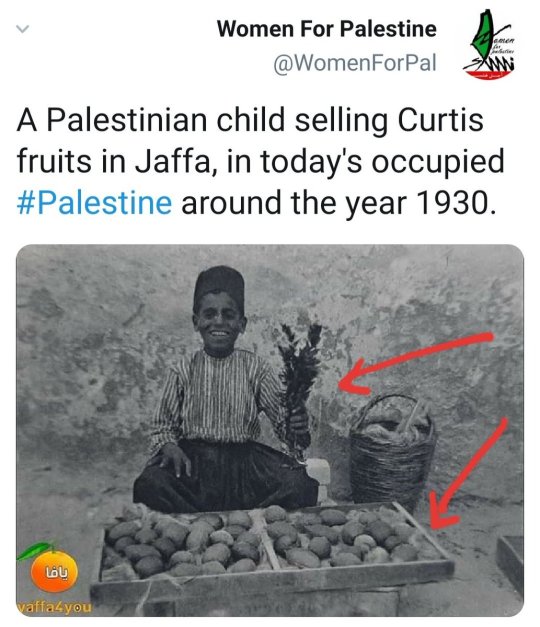
#yemen#jewish child#stealing jewish history#palestinian lies#secular-jew#israel#jewish#judaism#israeli#jerusalem#faux-Palestinian#Pallywood#so-called Palestinian#jewish history
793 notes
·
View notes
Text

This coin, from 70AD, almost 2000 years ago, says "Shekel of Israel" on the front, and "Jerusalem the Holy" on the back.
Jews are indigenous to Israel, and the Muslims are the colonizers, the imperialists, and oppressors.
The faux-Palestinian narrative is simply a case of basic gaslighting 101.
#gasloghting#israel#secular-jew#jewish#judaism#israeli#jerusalem#diaspora#secular jew#secularjew#islam#indigenous#indigeneity#Israel coinage#Israel coins#ancient coinage#ancient coins#you can't colonize your own land#Jews are indigenous to Israel
142 notes
·
View notes
Text
Listen up, folks. If you voted for third party or didn't vote in the us election, you supported trump.
That is quite literally the objective reality of how the system works.
You aren't a leftist, you're a moral grandstander with zero understanding of the situation we are in.
True leftists, wouldn't give their vote to dictator trump, in the name of "proving a point."
By voting third party or not at all, you helped the dictator who made it clear he plans to aid Isreal in their genocide of the Palestinian people, and ruined the us for lgbtqia+ folks.
You didn't "change the system" nor did you "show a reluctance to vote for the lesser evil." You showed a dictator how insanely gullible you are, by doing exactly what he wanted you to do. You played right into trumps hand and are parading around like some kind of savior.
You are "the blue maga" as one of your own tried to describe me. You are the folks who care more about appearing leftist, than doing what would actually help this country and Palestinians.
Leftism isn't about showboating and "showing your moral superiority." It's about doing what will ACTUALLY help the most people possible.
Change in the us starts at a local level. Vote third party for your governor, or representative. That is where third party stands a chance. It is quite literally guaranteed to lose in the presidential election.
(Btw, I voted third party in my local elections. In case the faux leftist who was trying to argue with me sees this, I wanted you to know that. I'm not against third party, I'm against throwing away your vote and supporting a dictator for literally zero positive change to happen as a result.)
#i hate showboating faux leftists so much jfc#transfem#transgender#wlw#lgbtqia#lgbt pride#lesbian#lgbtq community#lgbtq
17 notes
·
View notes